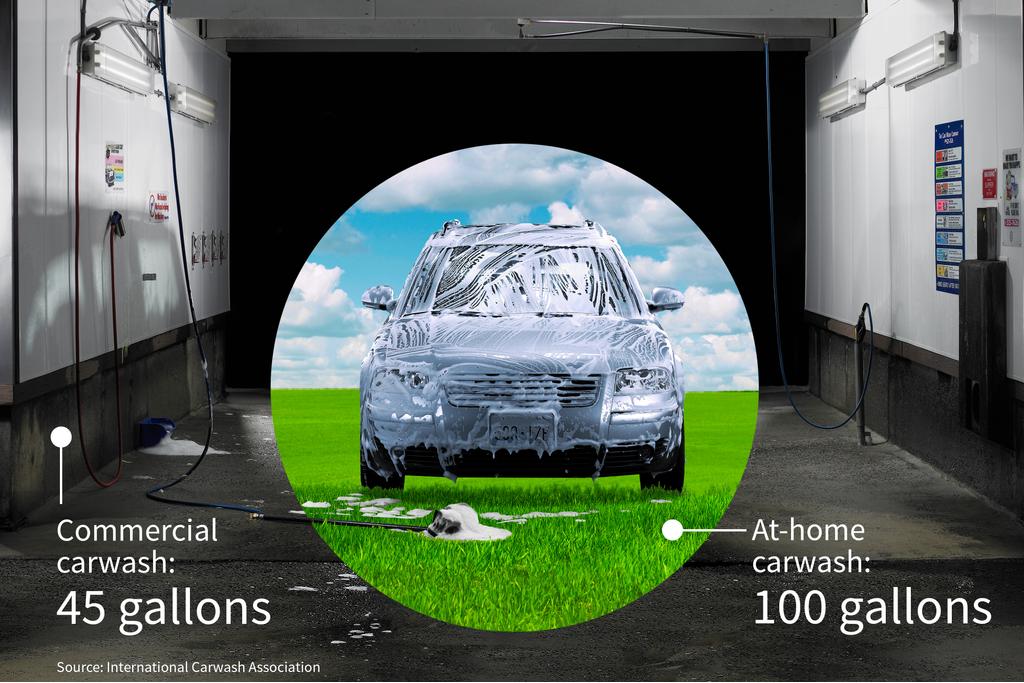
We totally get it: Knibb High football rules! And you want to show your school spirit by taking your ride to get scrubbed and squeegeed at the cheerleading squad's carwash fundraiser. However, hand-washing cars wastes an awful lot of water, and all due respect to those hardworking cheerleaders, you're trying your best to be conservative ... B-E-conservative!
Related: Why Do I Need to Check the Drain Holes in My Doors?
For those who want both a clean car and a clear conscience, it's important to understand that washing your car, generally speaking, uses a hell of a lot more water than a commercial carwash. It may seem counterintuitive that those big, highly mechanized facilities, with their high-pressure streams, would actually save more water than you can in your driveway with a bucket and a hose, but they do.
According to the International Carwash Association, the average commercial carwash uses about 45 gallons of water per car — the same amount used to do a load of laundry at home. Meanwhile, commercial facilities designated under the carwash association's WaterSavers program use no more than 40 gallons per car. The association estimates that using your garden hose at home blows through roughly 100 gallons per wash.
Beyond limiting the amount of water you use — vitally important in places like drought-stricken California — there's also pollution to consider. Eco-friendly commercial carwashes employ mechanisms for treating and recirculating the water they use, as opposed to residential washing, where the water ends up in the storm drains.
"Water entering storm drains, unlike water that enters sanitary sewers, does not undergo treatment before it is discharged," ICA states on its website. "So, when cars are washed on streets, parking lots and driveways, that dirty water eventually winds up in rivers, streams and lakes."
Multiply that by potentially millions of vehicles among the hundreds of millions in the U.S. and you can see how things start to get gross fast. According to a 2007-08 study by the Public Works Department in Federal Way, Wash., annual water pollutants produced by residential car-washing in the community of less than 100,000 people included 70 gallons of gasoline and diesel fuel; 120 gallons of motor oil; 450 pounds of phosphorous, nitrate, nitrite and ammonia; and 2,200 pounds of surfactants, a compound in detergent.
In Los Angeles, where water conservation is paramount, one new company is bridging the gap between the hand-wash and the commercial carwash with its Apple iPhone-app-based service. For $29 to $39, Squeegy will send a person to your car (within its designated service area), and wash it using a drought-friendly, pollutant- and runoff-free method that uses only a few ounces of water; you needn't even be present, and crews have all materials and equipment needed to do the job.
"Squeegy uses a high-quality wash and wax solution that is sprayed onto the vehicle," the company states on its website. "The solution lubricates the surface and encapsulates the dirt. We then use a high-quality microfiber cloths to lift the dirt off the vehicle leaving only a beautiful shine."
But perhaps you don't trust commercial carwashers to touch your baby. Or maybe you delight in donning some cutoff jean shorts and Wayfarers, and heading out to the driveway to scrub your car shiny to the sound of your portable radio. (Just me?) We put together some suggested best practices courtesy of Arizona Department of Water Resources to help get this dirty job done — but with maximum eco-friendliness.
- Use waterless carwash products such as scratch-free car dusters, cleaning waxes and wipe-away spray-on formulas that don't require rinsing.
- If you must wash with water, use a bucket and a sponge or towel and then rinse quickly with a hose when finished.
- Equip your hose with an automatic shutoff valve, or positive shutoff valve, so the water only runs when needed.
- Wash your vehicle on dirt or grass and avoid pavement to keep contaminated water out of the storm drain.
No comments:
Post a Comment